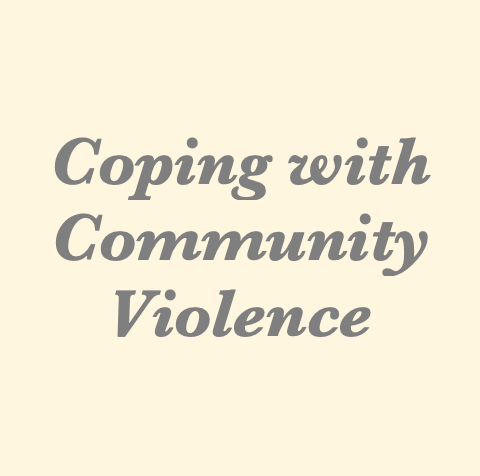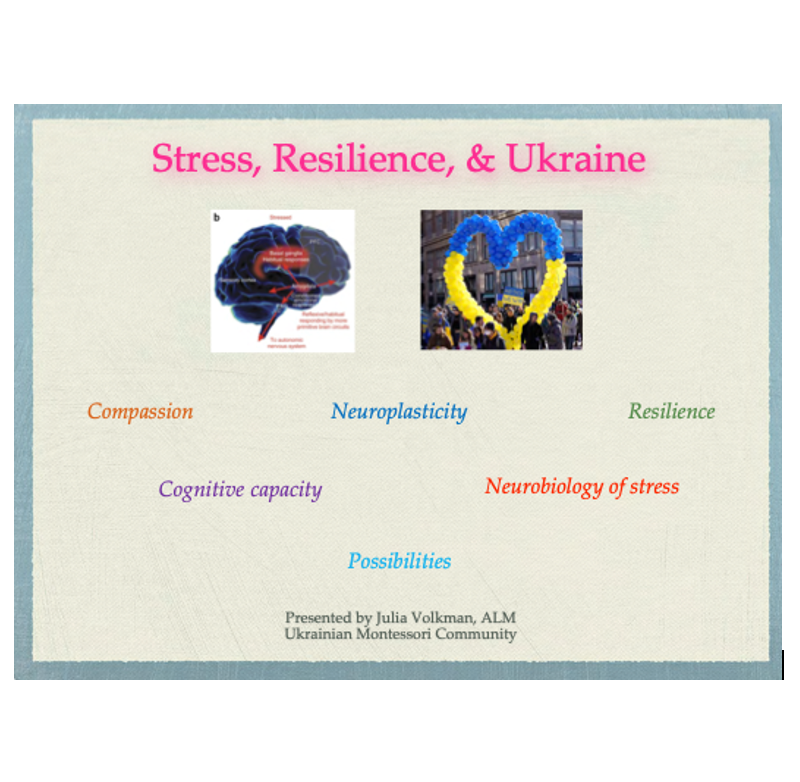Q&A with Ukrainian Parents
 Anna Volokhova, founder of the Ukrainian Montessori Community, organized a zoom conversation with me and parents living in Ukraine in the midst of war and those who were displaced due to the war. You can watch a recording of that call here but I've also written down some of the ordinary and extraordinary questions that came up.
Anna Volokhova, founder of the Ukrainian Montessori Community, organized a zoom conversation with me and parents living in Ukraine in the midst of war and those who were displaced due to the war. You can watch a recording of that call here but I've also written down some of the ordinary and extraordinary questions that came up.
I wasn't sure how to prepare for this gathering because I felt overwhelmed by what the families must be experiencing. But, in the end, I was amazed at their resilience and willingness to put their effort and energy into parenting in the midst of everything they are facing. I'll touch on some of the questions we discussed but I recommend you watch the entire recording to get all the details.
Harder to learn
A parent of children ages 9, 12, and 14 was concerned that (1) it seemed longer for her children to learn new things and (2) they seemed to be forgetting more. This can certainly happen when the brain is under a lot of stress. There are many reasons why but one is based on the sheer volume of things the brain needs to process during stressful times. Researchers call this cognitive load. Think about it this way, there is a limit to how much weight you can put on a scale. When you get past a certain point, the scale just gives you an error message. That's kind of what happens in an overloaded brain. The brain doesn't necessarily break or get damaged, it just can't process everything on its plate. So, there's kind of a competition for what actually gets processed. Your ability to pay attention, recognize things you already know, and remember new things is based on which of those networks "wins" the competition for brain real estate.
If you or your children are experiencing cognitive overload, the first thing to do is pause. Just pause and do nothing. Turn your attention to the air coming in and out of your nose. This is like giving a stadium some time to empty out after a big game. Just wait for it. Then, when you can feel some "space," look at your daily life and take anything off of your plate that you can, including downtime that is filled with media. Your brain needs less so it can keep up. Make time to take a walk and let your mind relax. If difficult thoughts are arising, turn your attention to the feel of your feet on the earth or the air as you breath. And prioritize sleep, that is where a lot of extra stuff is literally washed away.
Isolating as a coping mechanism
Another parent noticed that she and her children all wanted to retreat to their own space more than they used to. One child was on social media and another was reading books. They ate meals together, biked together, took turns cooking meals, and then they were off on their own. This actually looks a lot like many families in the US that I know! Especially since the pandemic, we all seem to be much more drawn to alone time.
If you see this happening in your life and want to change it, remember that the brain gets more efficient at anything it does repeatedly. So, if you or your family has developed a habit of isolating, it may take a little time to become more social. This is also related to cognitive load. Since we have so much to process, adding social relationships into the mix makes it that much harder for us to think with clarity. Interacting with others takes effort. But, having strong social relationships is also a key factor in being resilient/able to work with stress.
If you want to make a change, try to find ways to build relationship opportunities into your daily routines. Try cooking your meals together and cleaning up together instead of taking turns. Have a game night each week where you play a game you already know and enjoy (including sports games). Try biking slowly next to each other or taking a walk together so that talking about nothing can easily occur. Or, walking without speaking together might be the right thing, just silently noticing the trees or the buildings on your path. The power of letting your brain rest is truly restorative but it may take time before this becomes a new habit. So, make a plan and make yourself follow through until it becomes natural.
Learning new languages
Many of these families have had to leave Ukraine (leaving some in their family behind to fight the war). So, they and their children are now exposed to another language. But, even for the parents staying in Ukraine, there is a cultural drive to speak in Ukrainian even though many people grew up speaking Russian as their first language. Parents are concerned that this might be too much to ask of their children or that they might not be modeling the new language well. The short answer to this is, don't worry! Learning languages is great for the brain and the younger you are the less effort it will take to do so. But even when you're older, you can become completely fluent in other languages as long as you make an effort to do so.
My colleague at Harvard, Tracey Tokuhama-Espinosa, has a special interest and expansive knowledge about this topic. So, I refer you to her. You can watch one of her many videos about multilingualism below. Or, read some of her books, especially the one called Raising Multilingual Children.
Helping children learn to read
Many Ukrainian children have had to start at different schools. One parent was very busy with work in their new situation. Previously, she felt she never had to do anything specifically academic at home because her son's Montessori school was amazing and took care of all of that for her. Now that he's in a conventional kindergarten, she's concerned about his learning to read. But, because she's busy, she can't be his tutor. She needs a "soft" way to support his literacy growth.
The best way to do so is to just enjoy language. Sing songs, recite rhymes and poems, read books aloud together, play word games (tongue twisters are one of my favorites), etc. And don't be afraid to use big words! You want to offer the child the absolute best your language has to offer.
If your child is young, a simple thing to do is starting singing your alphabet song but sing it with the sounds of the letters instead of their names. (You can hear an example of the alphabet song with sounds in English here.) You can also read many other articles on this blog about language development. In particular, look at:
- Five steps to literacy
- Language activities for the unexpected homeschooler
- Language development: the big picture
I hope this helps. Please add your thoughts, comments, and questions below. It takes all of us working together to truly help remove some of the confusion in the world!
References
Franconeri, S. L., Alvarez, G. A., & Cavanagh, P. (2013). Flexible cognitive resources: competitive content maps for attention and memory. Trends in Cognitive Sciences, 17(3), 134-141.
Xie, L., Kang, H., Xu, Q., Chen, M. J., Liao, Y., Thiyagarajan, M., ... & Nedergaard, M. (2013). Sleep drives metabolite clearance from the adult brain. Science, 342(6156), 373-377.








Leave a comment
This site is protected by hCaptcha and the hCaptcha Privacy Policy and Terms of Service apply.